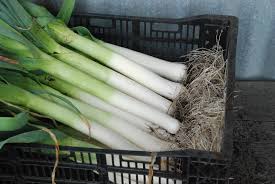
Are you in need of in-depth knowledge on onion and garlic production? If yes, we are a call away. Contact us for: Onion seedlings, Garlic seedlings, Germinated garlic cloves, Farm planning services, Soil testing, training on onion and garlic growing, Drip irrigation installation and maintenance, Agronomic support, Onion and Garlic value pack and Farm management. For free consultation, placing orders or booking a visit with an agronomist, please contact us via Call or what’s app +254703982228, Email: Info@oniondoctor.co.ke. You can also check out our social media handles for daily updates on TikTok: https://www.tiktok.com/@oniondoctorke?_t=ZM-8wmsTu0qumO&_r=1 Instagram: https://www.instagram.com/oniondoctorke?igsh=MTVoaHF3aWUydTJzaQ==Facebook:https://www.facebook.com/share/16SwgYn2dG/ Youtube:https://youtube.com/@oniondoctorke?si=u5Jnd-r0qU9UDYqL and Twitter: https://x.com/OnionDoctorKe?t=FR3JXlS_oN1vjjUgAtfyzg&s=09
Leek farming is an agricultural practice that involves the cultivation of leek plants for commercial purposes. Leeks are a type of vegetable belonging to the Allium family, closely related to onions and garlic. They have a mild onion-like flavor and are commonly used in various culinary dishes.While leek farming is not as widespread in Kenya as some other crops, it is still possible to grow leeks successfully in the country. Here are some key points to consider when it comes to leek farming in Kenya:
- Climate and Soil Conditions: Leeks thrive in cool and temperate climates. In Kenya, regions with higher altitudes and cooler temperatures, such as parts of the Rift Valley and central highlands, are more suitable for leek cultivation. Leeks prefer well-drained soil rich in organic matter, with a pH level between 6.0 and 7.0.
- Varieties: There are several leek varieties available for cultivation. Some popular varieties include: King Richard, Varna, Dawn Giant, Italian Giant, Leek Long Shank, Leeks Carentan and American Flag. It’s important to select varieties that are well-suited to the local climate and have a good market demand.
- Seed Selection and Planting: We train on how to select high-quality leek seeds . Leek seeds are usually sown in nursery beds or trays, and the seedlings are transplanted to the main field once they reach 8-10 weeks old. Adequate spacing between plants is crucial to allow healthy growth, typically around 15-20 centimeters between plants and 30-40 centimeters between rows.
- Crop Management: Leeks require regular watering to maintain consistent soil moisture levels, especially during dry periods, To keep consistency in moisture levels, Drip Irrigation is the most efficient method. We offer Drip installation services country wide at competitive prices . Mulching can help conserve soil moisture and suppress weed growth. Fertilizer application should be based on soil tests and the specific nutrient requirements of leeks. Regular weeding is necessary to minimize competition for nutrients and ensure optimal growth.
- Pest and Disease Control: Common pests that can affect leeks include aphids, thrips, and onion flies. Regular scouting and appropriate pest control measures, such as insecticidal sprays or biological controls, should be implemented as needed. Diseases like fungal infections (e.g., leaf blight) can also impact leeks, so practicing crop rotation and maintaining good hygiene in the field are essential for disease prevention.
- Harvesting and Marketing: Leeks are typically ready for harvest around 90-120 days after transplanting. Harvesting can be done by gently loosening the soil around the base of the leeks and pulling them out. The harvested leeks should be cleaned and trimmed before they are packed for market. Establishing good market connections, such as local markets, restaurants, and supermarkets, is crucial for successful marketing and selling the leeks.
Onion Doctor supports small holder farmers across Africa with quality and affordable Onion and Garlic seedlings, Onion seedlings, Farm planning services, Soil testing, Drip irrigation installation and maintenance, Agronomic support, Onion and Garlic value pack, Farm management, E-extension and on-farm training for farmers to optimize on yields and get maximum profits.